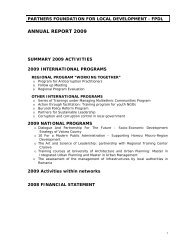Organizational Development: A Manual for Managers and ... - FPDL
Organizational Development: A Manual for Managers and ... - FPDL
Organizational Development: A Manual for Managers and ... - FPDL
Create successful ePaper yourself
Turn your PDF publications into a flip-book with our unique Google optimized e-Paper software.
follow <strong>and</strong> control it every moment – instead of controlling symptoms <strong>and</strong> fighting consequences,<br />
which would not be the job of a strategist; it would be the job of a controller.<br />
At the points of bifurcations, a manager may create or eliminate very small (but still to be crucial)<br />
factors at the level of fluctuations or substructures, <strong>and</strong> thereby guide further development. For<br />
example, a manager accidentally meets with an employee who is deliberating over an offer <strong>for</strong> a<br />
similar position in another organization. He may accept it because of some provisional gain. He<br />
may not accept it because there are some advantages in staying where he is. The boss, who<br />
‘accidentally’ meets him in the corridor, may express a very positive mood <strong>and</strong> drop a hint about a<br />
possible promotion. Then the employee will stay. Or the boss may very warmly let him underst<strong>and</strong>,<br />
how sorry he is that there is no chance <strong>for</strong> promotion in the organization, even <strong>for</strong> such a good<br />
specialist. Then the employee will leave. Either choice will change the situation. They may happen<br />
accidentally; or they may be controlled. Would it be a strategic course of action <strong>for</strong> the manager?<br />
We think - yes - because it will have a long-term effect on the organization.<br />
The course of action is strategic when the object of action is a certain continual factor (or set of<br />
factors) that will influence the further development of events. It is also strategic when the object of<br />
action is possible bifurcation, because it also changes the l<strong>and</strong>scape <strong>for</strong> the future. It does not<br />
matter who does it. Top managers are usually in a better position to change l<strong>and</strong>scape-<strong>for</strong>ming<br />
factors, although they are not in an exclusive position. The leader of a small team or head of a<br />
technical subdivision may also contribute to significant changes in l<strong>and</strong>scape that are <strong>for</strong>med by<br />
factors controllable at their level. And bifurcations may be controlled by anybody who is smart<br />
enough. That is why many organizations move in directions determined by certain ‘grey cardinals’<br />
(man behind) who have little official power, but control nearly everything that strategically counts.<br />
Apology of strategic planning<br />
Another characteristic feature of strategic management is that it is intentionality aimed at a certain<br />
future situation. It is directed by the desirable future position. Thus, the future position should exist<br />
somewhere in the mind of a manager as a clear objective (zone of com<strong>for</strong>t), or as a SMART goal<br />
(a point in the zone), or, at least as vain dream. Where does this optimistic hypothesis (that a<br />
certain future position offers an advantage in acquiring some designated gain) come from?<br />
Let’s see. An organization is proceeding along its way within a given l<strong>and</strong>scape. If the manager is<br />
doing nothing – one of several possible future states will come in time. If only one future state is<br />
possible, or these future states are all equal in value, <strong>and</strong> any one is good enough – then there is<br />
nothing <strong>for</strong> the manager to do. The best strategic course of action then will be to do nothing (as<br />
General Kutuzov did after Napoleon trapped himself in the cold Russian winter).<br />
143
















